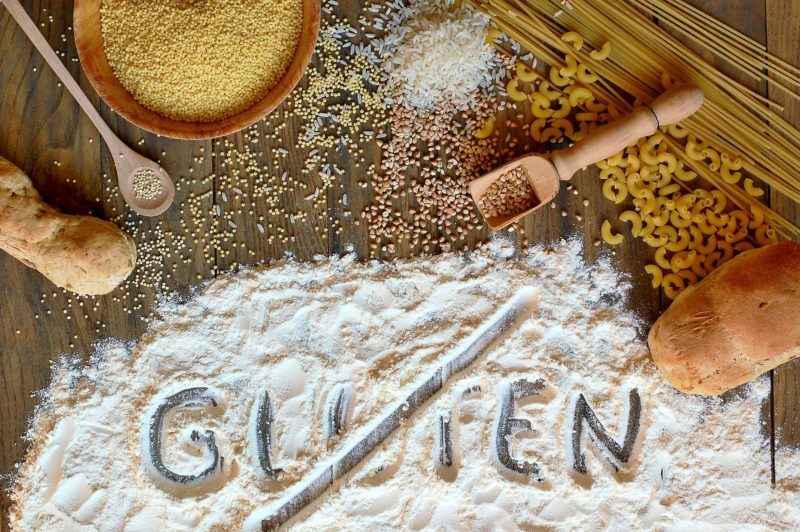SHOULD I BE EATING GLUTEN-FREE?
About 11 years ago, I was having a conversation with a woman about food choices and how different foods affect body functions. I told her that I was experiencing fatigue, abdominal pain, bloating, and digestive upset when I consumed breads, pasta, and other wheat-containing foods. She introduced to me and explained a condition called gluten intolerance. Following our conversation, I decided that I would try eliminating gluten-containing foods from my diet for two months. I would then re-introduce these foods gradually to see if my body would have a reaction. Lo and behold, it did. I have since learned that I am gluten intolerant (aka non-celiac gluten sensitive). I avoid gluten! I stay far away. That pain and discomfort is not worth a few moments of gustatory glory. So….
What is gluten?
Gluten is a protein found naturally in wheat, barley and rye. It helps maintain the shape of the food and acts as a glue that holds it together.
Most common foods containing gluten:
- Bread/wraps
- Pasta
- Pastry
- Cereal
- Crackers
- Pancakes/waffles
- Baked goods including cake, cookies, donuts
- Most noodles -ramen, soba, chow mien
- Oats – usually, unless certified gluten-free
- Gravy
- Beer
- Malt products
Other foods which may unexpectedly contain gluten:
- Soups
- Salad dressings
- Soy sauce
- Granola bars
- Multi-grain/artisan tortilla chips
- French fries
- Candy/candy bars
- Chips
- Brown rice syrup
- Meat substitutes – seitan, veggie burger
- Luncheon meats
- Eggs made in restaurants may contain pancake mix
What is the difference between gluten allergy, celiac disease and intolerance?
Gluten allergy is an immune condition where mild to life-threatening symptoms occur within moments of consuming the product. Symptoms may include nausea, vomiting, diarrhea, hives/rash, irritation in mouth and throat, eye irritation, and/or difficulty breathing.
Celiac disease is an auto-immune condition where there is an immune response within the intestines which breaks down the intestinal lining and therefore prevents the absorption of nutrients by the body. The intestinal damage often causes diarrhea, fatigue, weight loss, bloating and anemia, and can lead to serious health complications. Symptoms of celiac disease include diarrhea, fatigue, weight loss, bloating, gas, abdominal pain, nausea, vomiting, and constipation, anemia (usually from iron deficiency), loss of bone density (osteoporosis) or softening of bone, itchy/blistery skin rash, mouth ulcers, headaches, fatigue, and/or joint pain.
Gluten intolerance (or non-celiac gluten sensitivity) is a digestive disorder where one cannot tolerate gluten. The symptoms are similar to those with celiac disease although the condition doesn’t damage the intestines in the way that celiac disease does.
If you have any of the conditions above, then the best way to manage your symptoms is to follow a gluten-free nutrition plan.
If you don’t have any of the conditions above, then enjoy your gluten. Contrary to fictional belief, gluten is not bad for you!!
Be sure to consult with your doctor/naturopath and a qualified Registered Holistic Nutritionist, Registered Holistic Nutrition Consultant, or a Registered Dietician before beginning any new nutrition plan.
Risks of deficiency while following a gluten free diet
Individuals following a gluten-free diet commonly do not consume adequate amounts of fiber nor vitamins and minerals, particularly vitamin D, vitamin B12, folate, iron, magnesium, calcium, and zinc.
The risk of nutrient deficiencies is greater if gluten-containing foods such as breads, pastas, and cookies are replaced with highly refined gluten-free alternatives. Gluten-free processed foods are typically lower in fiber, vitamins, and minerals than their wheat counterparts (both naturally and due to the lack of enrichment in gluten-free foods), as well as having a higher glycemic index.
How to avoid deficiencies
Eat a whole food, nutrient-rich diet consisting of foods as close to its natural state as possible.
Food sources of fiber
- Wholegrains such as: brown rice, buckwheat, quinoa, amaranth, millet, sorghum, gluten-free rolled or steel cut oats
- Fruit – especially with an edible skin or dried fruit
- Vegetables – especially ones that can be cooked such as broccoli, cauliflower, cabbage and potato with the skin and sweet potato
- Lentils, legumes and pulses (e.g. Black beans, chickpeas, red kidney beans, navy beans, split peas)
- Nuts and seeds including chia seeds
Food sources of vitamin D
- Salmon, sardines, shrimp, cod
Food sources of vitamin B
- Vitamin B1 (Thiamin): Sunflower seeds, black beans, tuna, green peas, lentils
- Vitamin B2 (Riboflavin): Mushrooms, cooked spinach, venison, soybeans
- Vitamin B3 (Niacin): Mushrooms, avocados, broccoli, tuna, salmon, chicken breast
- Vitamin B6: pork, poultry, fish, bread, wholegrain cereals such as oatmeal, brown rice, eggs, potatoes, squash, spinach, green peas, chickpeas, bananas, avocado
- Vitamin B9 (Folate): Green leafy vegetables (spinach, romaine lettuce, turnip greens), asparagus, lentils, beets, broccoli
- Vitamin B12: meat, eggs, milk, dairy products
Food sources of iron
- Red meats, dark meat (such as thigh and drumstick) of chicken and turkey, green leafy vegetables, tofu, lentils and legumes
Food sources of magnesium
- Green leafy vegetables (spinach, Swiss chard), pumpkin seeds, sunflower seeds, black beans
Food sources of calcium
- Green leafy vegetables (spinach, turnip greens, collard greens), sardines, almonds, sesame seeds, seaweed (nori, kelp)
Food sources of zinc
- Lamb, beef, asparagus, chard, spinach, mushrooms, scallops, oysters, sesame seeds, pumpkin seeds, turkey, shrimp, and green peas.
How to protect yourself from accidentally ingesting gluten?
- Cook from scratch.
- Create your own sauces, seasonings and marinades.
- Look for Gluten-free certified labels.
- Read the ingredients list.
If you think you might suffer from a gluten- or wheat-related condition, then it’s important that you talk to your doctor before diagnosing yourself or beginning any treatment on your own. It’s especially important to see a doctor in order to rule out celiac disease as this can lead to severe health complications.

